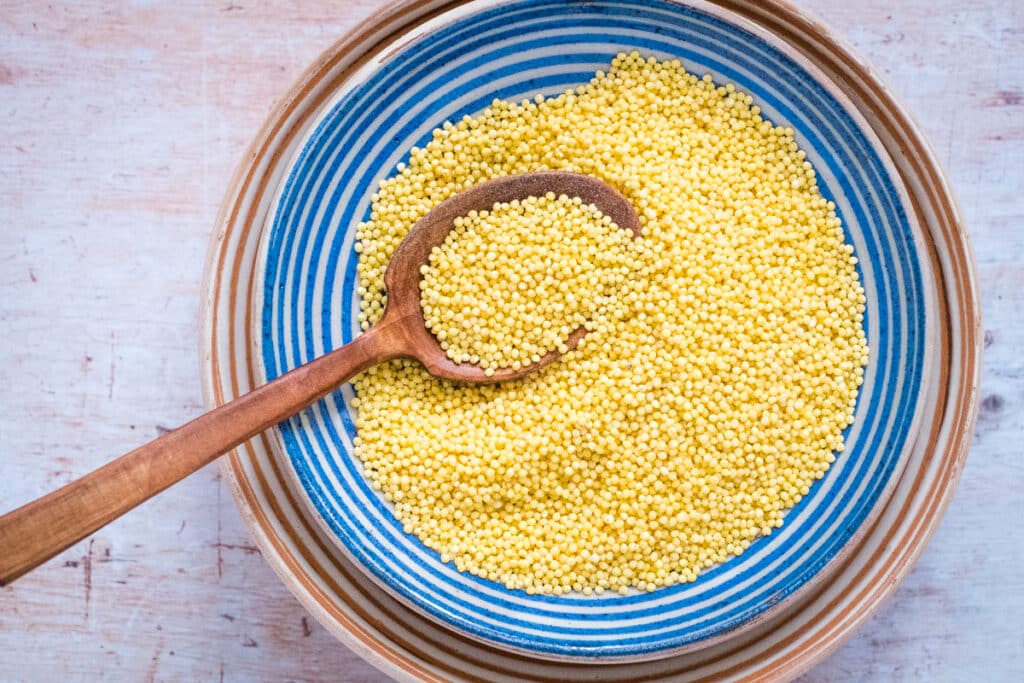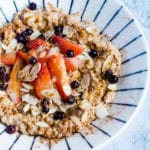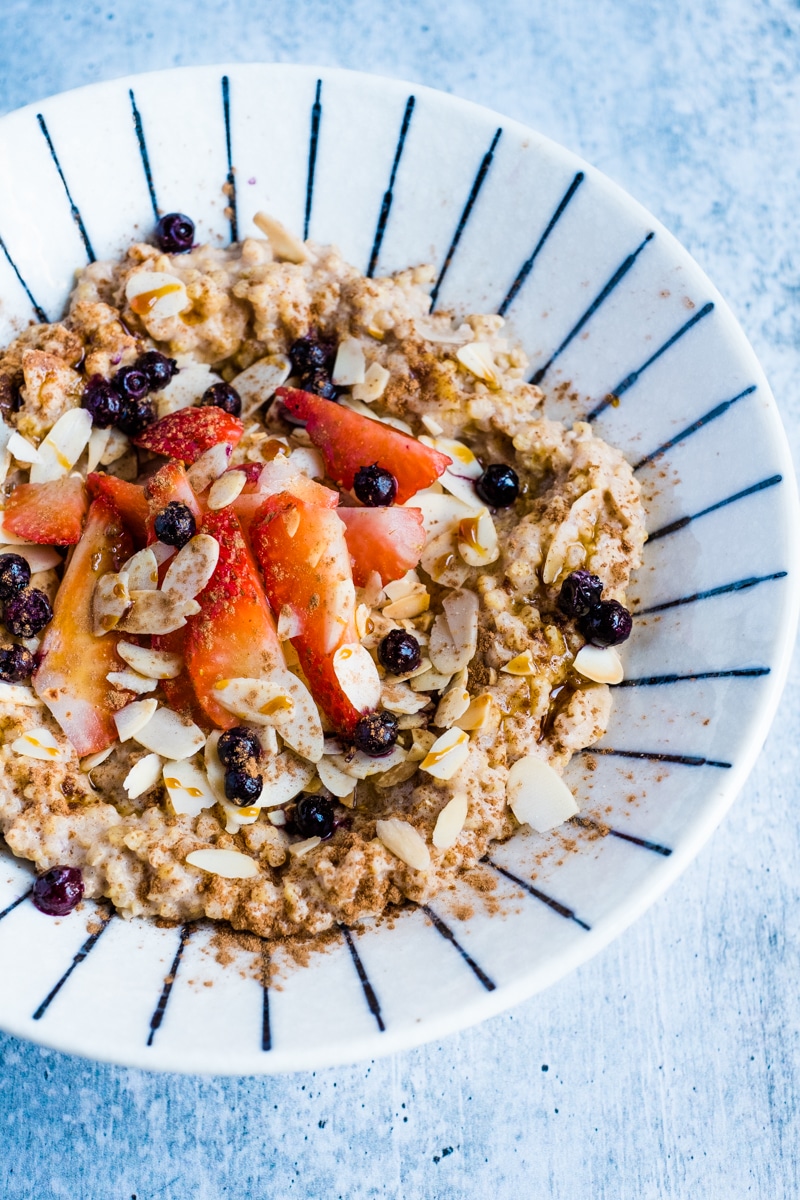Creamy and comforting, this millet porridge is a delicious lectin-free alternative to oatmeal. While this is a breakfast porridge, it is the most soothing meal to have any time of the day because it’s so easy to personalize.
Does oatmeal have lectins?
Yes, oats and oatmeal are high in lectins. But don’t worry, there are plenty of delicious lectin-free alternatives to oatmeal. You can make porridge with millet, sorghum, teff, and fonio. All these are nutritious ancient grains that are lectin-free and gluten-free, making a comeback.
Many people have oatmeal or oat porridge for breakfast and consider it a healthy meal. I used to have oatmeal for breakfast before I started the plant paradox program, and I did not feel good. I was inflamed and packed pounds even though I was eating foods that were considered healthy, and I had what many would consider a healthy lifestyle.
When I embarked on a lectin-free diet, I was looking for something to replace my morning oatmeal, at least occasionally. What I wanted was something warm, creamy, and soothing. And the first lectin-free grain I learned to work with and make porridge was millet.
I recently started working with fonio. For a delicious porridge with fonio, try this creamy fonio porridge with almonds and blueberries.
Millet, an ancient grain making a comeback
Even though not as known in Western cuisine, millet has been around for a long time. Millet is an ancient grain used in cuisines worldwide, especially in Africa and Asia, but also in Europe, tracing back thousands of years.
It was the primary grain in China before rice became popular and the main grain in my native country, Romania, before corn was introduced in agriculture. Before wheat, Romans ate porridge or a type of polenta made with millet. It is still the primary grain in many African countries and is returning to Western diets.
Millet health benefits
Millet is a gluten-free and lectin-free grain, and it is high in protein, iron, magnesium, manganese, phosphorus, and lots of fiber that our gut bugs love.
There are claims that millet is not good for us because it contains goitrogenic substances, which can suppress the functioning of the thyroid gland.
But like with anything, moderation is the secret to consuming food without it becoming poison. Lectin-free or not, don’t have any grain porridge every day. I’m a big fan of rotating foods. Have millet porridge one day of the week, then have eggs, then pancakes, then a green smoothie, then some nuts with yogurt, and so on.

How to pre-cook millet
Soaking millet is optional, but it does help with better digestion and better absorption of nutrients. Soak it for a few hours before cooking, changing the water several times, to activate the enzyme phytase, which then will help break down phytic acid, an anti-nutrient in grains that interferes with the absorption of nutrients.
To cook millet in a pressure cooker: toast 1 cup of millet until fragrant, 2 to 4 minutes, using the sauté option if available, add 2 cups of water, and pressure cook for 10 minutes. Let the pressure release naturally. Store in the refrigerator for a few days and use to make millet porridge. Millet gets dry when cold, and that’s why it is so perfect for porridge. Just rehydrate it with your favorite non-dairy milk.
To cook millet on the stove (for porridge): toast one cup of millet, add 4 cups of water, bring to a boil, reduce the heat to low, and simmer until all the water is absorbed, for about 30 minutes. Cool and refrigerate.

Ingredients to make creamy millet porridge
- 1 heaping cup of pre-cooked millet
- about 2/3 cup unsweetened hemp milk / or other non-dairy milk, like tigernut milk or coconut milk
- 1 teaspoon or more cinnamon powder
- pinch of salt
- 2 teaspoons nut butter
- 1 teaspoon vanilla extract
- about 1/4 cup sliced, blanched, toasted almonds
- a small handful of berries / seasonal fresh fruit
- 1/2 teaspoon Yacon Syrup or another natural, zero-calorie sweetener
- Optional: Lion’s Mane (or any mushroom powder you like), cacao nibs, grated chocolate, coconut flakes
How to make millet porridge (using pre-cooked millet)
- In a saucepan, mix the pre-cooked millet with 1/2 cup milk and reheat on the stove, on low to medium heat. Once hot, start adding the rest of the milk. You can add as much as you need to reach your favorite consistency.
- Turn the heat to low, and add the vanilla, half of the almonds, the nut butter, cinnamon, and salt.
- Mix it all, and add more milk if you feel it is too thick. Add the mushroom powder, if using, and mix well.
- Add the porridge to serving bowls, sprinkle with more cinnamon, the rest of the almonds, a few berries, and a drizzle of Yacon Syrup.
More lectin-free breakfast ideas
This recipe is part of The Ultimate Lectin-Free Breakfast Guide, Recipe Round-Up; check it out for more tasty and satisfying lectin-free breakfast ideas.
More gluten-free and lectin-free millet recipes
- Millet Pancakes with Green Bananas
- Easy Millet Salad with Parsley and Mint
- Gluten-Free Millet Stuffing
- Millet Bread with Walnuts
- Millet Flakes Chocolate Chip Cookies
- Thyme Roasted Mushrooms with Millet Polenta
- Millet Tabbouleh with Hemp Hearts
- Warm Brussels Sprouts and Millet Salad
And if you want to read more about the four gluten-free and lectin-free grains, millet, sorghum, fonio, and teff, check out this article: The four gut-healthy, lectin-free, and gluten-free grains.
*This post contains affiliated links, which means I get a small commission if you choose to purchase something via one of my links, at no extra cost to you.
Print
How to Make Millet Porridge (A Great Lectin-Free Oatmeal Substitute)
- Prep Time: 5 minutes
- Cook Time: 5 minutes (up to 10 mintues)
- Total Time: 10 minutes
- Yield: 2
Description
A lectin-free alternative to oats porridge and a great plant-based breakfast option.
Ingredients
- 1 heaping cup pre-cooked millet (check the post above for instructions on how to pre-cook millet)
- about 2/3 cup unsweetened hemp milk / or other non-dairy milk, like coconut milk
- 1 teaspoon or more cinnamon powder
- pinch of salt
- 2 teaspoons nut butter
- 1 teaspoon vanilla extract
- about 1/4 cup sliced, blanched, toasted almonds
- a small handful of berries / seasonal fruits
- 1/2 teaspoon Yacon Syrup or another natural, zero-calorie sweetener
- Optional: Lion’s Mane (or any mushroom powder you like), cacao nibs, grated chocolate, coconut flakes
Instructions
- In a saucepan, mix the pre-cooked millet with 1/2 cup milk and reheat on the stove, on low to medium heat. Once hot, start adding the rest of the milk. You can add as much as you need to reach your favorite consistency.
- Turn the heat to the lowest, and add the vanilla, half of the almonds, the nut butter, cinnamon, and salt.
- Mix it all, and add more milk if you feel is too thick. Add the mushroom powder if using, and mix well.
- Add the porridge to serving bowls, sprinkle with more cinnamon, the rest of the almonds, a few berries, and a drizzle of Yacon Syrup.
Notes
To cook millet in a pressure cooker: toast 1 cup of millet until fragrant, 2 to 4 minutes, using the sauté option if available, add 2 cups of water, and pressure cook for 10 minutes. Let the pressure release naturally. Store in the refrigerator for a few days and use to make millet porridge.
To cook millet on the stove (for porridge): toast one cup of millet, add 4 cups of water, bring to a boil, reduce the heat to low and simmer until all the water is absorbed, for about 30 minutes. Cool and refrigerate.

24 Comments
Brooke
January 26, 2023 at 1:44 amI’m looking for a way to make lectin free overnight oats. Could I use the cooked mullet instead of oats or do you need to heat the millet again as you have done in this recipe? Thank you, I have learnt so much from your website and cook books!
Claudia
January 26, 2023 at 2:50 amHi Brooke, I think the only way to do this is to precook the millet, then rehydrate it in the morning, like in this recipe. Or, you can buy millet flakes, but they need to be cooked, I wouldn’t eat millet just soaked (to be honest, I don’t even like the idea of eating oats without cooking them). Millet flakes are just like oats, they are easy to cook, and it will just take a few minutes. They are more processed though, so they probably have a higher glycemic index. I hope this helps. xx
Vicky O'Neill
November 22, 2021 at 7:09 pmI just got a bag of millet flakes to make sweet potato cookies – can this be used to make porridge? If so, how?
Claudia
November 23, 2021 at 4:05 amYes, totally! Boil water + non dairy milk of choice, turn heat off and add the flakes (there must be some instructions on the bag on proportions?). I think it might be x4 cups liquid to 1 cup flakes, but it also depends on the consistency you desire. Stir well, add a lid on and let it sit for 5 minutes or so, until the liquid is absorbed. Add some other ingredients like nut butter, fruits, nuts etc.
Merciful faith
November 11, 2020 at 1:22 pmThanks for this information. But do you mean grinded millet? Like the powder? Or the millet seed itself. I am asking because I can’t imagine cooking it, considering the hard nature. Please help out. Thanks
Claudia
November 13, 2020 at 2:17 amHi! This is made with millet, the grains. Millet can be cooked relatively easy, on the stove or in the pressure cooker. I like millet flakes but they are hard to find, and I don’t like millet flour at all, so I don’t work with it. I hope this helps.
Andrea Field
November 26, 2019 at 10:13 amWhat are your thoughts on puffed millet can we use that to make this?
Andrea
November 26, 2019 at 9:42 amHow about puffed millet? Can we use that?
Claudia
December 2, 2019 at 8:59 amHi Andrea, puffed millet can be used as is instead of breakfast cereals, I even make desserts with it. But not for this recipe.